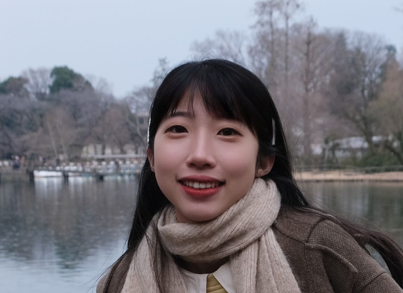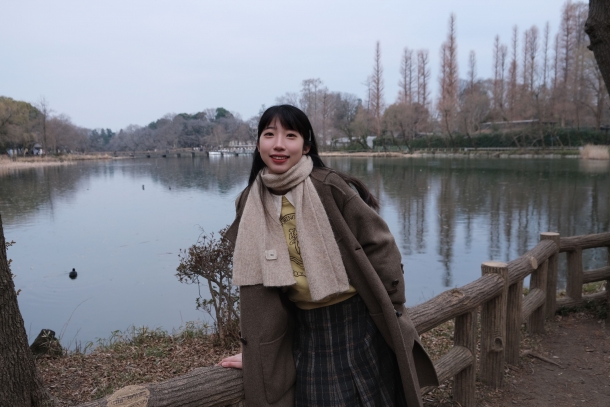- News
- Living as A Critical Being(Global Japanese Literary and Cultural Studies (Global-J) :WANG Yulin)
Living as A Critical Being(Global Japanese Literary and Cultural Studies (Global-J) :WANG Yulin)

- Posted
- Mon, 03 Apr 2023

WANG Yulin (Master’s Program (Global-J))
Reasons for applying for the Global-J master’s program
My encounter with the Global Japanese Literary and Cultural Studies Program was serendipitous. I was a Chinese literature major during my undergraduate studies, but I started reading Japanese literature in translation from an early age. Shocked by the fact that women’s contributions were disregarded or even distorted during the COVID-19 pandemic, I kept questioning women writers’ positions and roles in canon formation, which further fueled my passion for studying comparative women’s literary history. In 2020, when searching for a program that accommodates and values diversity in languages and perspectives, I was thrilled to learn that Waseda University had just announced the establishment of a new Global-J master’s program, promising future students openness and inclusiveness in research. Feeling its call, I applied for this program, hoping to find a place where I could freely immerse myself in subjects that might be regarded as “insignificant”—the first generation of modern Japanese women writers. Luckily enough, I became a part of the program’s first cohort of students.
From Japan to the world, from Japanese studies to all knowledge
People here are of various academic backgrounds, and what brought us together is our shared interest in Japanese literature and culture. As we are working in vastly different fields, a broad horizon is built collectively through conversations, allowing every individual in this program to grasp the major concerns and current trends of Japanese studies in general while delving deep into specific topics. In Global-J, we are encouraged to discover and maximize our uniqueness and talents to create new connections. Moreover, our bond with fellow students brings about genuine interest and respect for diverse cultures and other ways of perceiving the world that would help break down personal limitations.
Global-J offers an ideal platform for communication. In seminars, we practice critical analysis with research students and students from the Global-J PhD program as well as other universities; in interactive lectures, we spend hours and hours discussing the latest publications of both Japanese and English scholarship under the guidance of professors; workshops with visiting researchers not only open up new possibilities but also offer chances to expand our network; courses taken with undergraduates from JCulP provide us with precious examples to learn how to be qualified teachers in the future. For me, the most magical moments during my life here are the time when those distant names of heavy hitters and renowned writers become real people that are unexpectedly close to us on campus.
Besides preparing its students with specialized knowledge, the Global-J program equips us with the capacity to learn and the habit of rethinking all established common senses, knowledge, and discourses. When I first entered the program, I was uncertain about my ability to understand Meiji-period texts in their original form or articulate myself properly in academic English. After one and a half years of intensive and solid training, most worries naturally disappear. I now believe that there is no knowledge in this world that cannot be acquired, as long as we have enough determination. With personalized research guidance and material aids, Global-J becomes our strongest support in developing and realizing even our most imaginative research ideas.
As professors here always remind us, we are the ones who will participate in the rewriting of canons and the reproduction of knowledge. Critical consciousness is a crucial starting point, and the realization of a more equal and balanced future requires our sense of cultural and social responsibility. After all, representations are not the ultimate end, but life is.
Thoughts about my research in Global-J
My master’s research project explores the lives and writings of Meiji women writers who worked as editors and reporters for Jogaku zasshi (Women’s Education Magazine, 1885-1904). At a time when women were officially barred from becoming editors by the Press Regulations, this magazine and its female staff played an important role in resisting discriminatory laws during Japan’s nation-building era. These women writers’ discursive agency, the social and political contexts in which they were creating, and their relationship with the whole publishing industry are the main focuses of my thesis. Through my little efforts, I aim to share not only their struggles and hardships but also their exciting adventures and playful gestures with people in and outside Japan.
New sparks are often generated by interactions with Global-J friends and supervisors. Without the congenial and highly intellectual atmosphere in which we can freely express our immature thoughts and receive insightful comments, it would be impossible for me to form a clear picture of my long-time academic pursuit. All in all, conducting research in Global-J is a process of constantly challenging and reconstructing oneself. Learning how to live with and even enjoy the instability will be a valuable experience to treasure for a lifetime. After graduation, I wish to first work in publishing, dealing translated literature and scholarly works in order to fully utilize what I have gained from Global-J, better situate my research in real life, and act as a bridge between different cultures.
Profile
Wang Yulin is a current student in the Global Japanese Literary and Cultural Studies Master’s Program at Waseda University. She received her Bachelor’s Degree in Chinese Language and Literature from Fudan University, Shanghai. Her undergraduate thesis was a comparative study of schoolgirl-related novels written by Miyake Kaho (1868-1943) and Chen Hengzhe (1890-1976). Recently, she has been researching Meiji women writers and the female homosocial community of the Meiji publishing world.
(Contributed March 2023)
- Links
- 先輩紹介ページ
